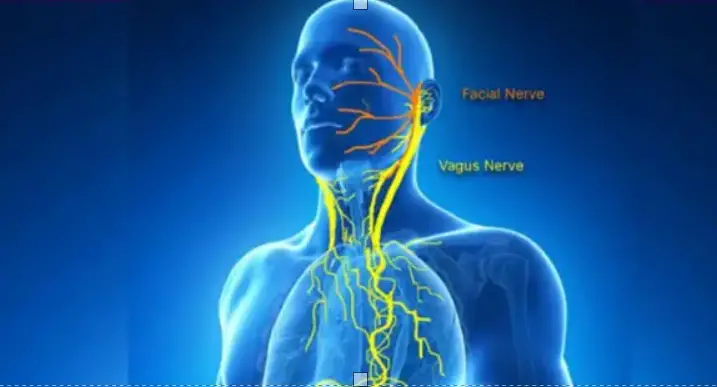Something comes together with sound and vibration. Nikola Tesla once said ‘If you want to find the secrets of the universe, think in terms of energy, frequency and vibration.’ I think he was onto something.
It turns out, this wasn’t just a hypothesis or theory. There’s actual science behind it. The largest nerve in our body known as the vagus nerve plays a crucial role in many biological functions.
Take a look at the largest nerve in your body, and what it does for your health and biology.
The vagus nerve, a key component of the autonomic nervous system, governs various bodily functions, extending from heart rate regulation and digestion to mood and inflammatory responses. While not directly responsible for processes like erection or moisture in women, it does play a role in some related aspects of sexual function indirectly.
What Are The Key Functions of The Vagus Nerve?
- Regulation of Heart Rate: The vagus nerve is primarily involved in controlling heart rate, contributing to a balance between the sympathetic and parasympathetic nervous systems, thereby influencing cardiovascular health.
- Digestive System Control: It regulates digestion by coordinating processes like swallowing, stomach acid secretion, and gut motility, maintaining the smooth functioning of the gastrointestinal tract.
- Respiratory Function: The vagus nerve helps regulate breathing, controlling the rate and depth of respiration by connecting to the respiratory muscles.
- Mood and Emotional Regulation: It influences stress responses, mood, and anxiety, although it’s not directly involved in sexual arousal or moisture in women. Some studies suggest vagus nerve stimulation can impact mood disorders.
- Inflammatory Response and Immune Function: The vagus nerve modulates the inflammatory response by inhibiting the release of pro-inflammatory cytokines, playing a role in immune function.
- Sexual Function (Erection in Men/Moisture in Women): The vagus nerve isn’t directly responsible for erection in men or moisture in women. These functions are primarily controlled by the parasympathetic nervous system, involving nerves specific to the genitals. However, the vagus nerve’s role in overall relaxation, stress modulation, and its connection to the autonomic nervous system indirectly influence sexual arousal and responses in both men and women.
In summary, the vagus nerve impacts a wide range of bodily functions but isn’t directly involved in specific sexual responses like erection in men or moisture in women. Its influence on overall relaxation and connection to the autonomic nervous system indirectly affects various aspects of sexual function and well-being.
Simply Humming Does This For Your Vagus Nerve
Humming, as a simple yet effective practice, can stimulate the vagus nerve through several mechanisms. The vagus nerve is closely linked to the muscles in the back of the throat and the vocal cords, making humming an accessible way to activate this crucial nerve.
When you hum, you engage the muscles in the back of your throat and your larynx (voice box). This action can directly stimulate the branches of the vagus nerve that are located in these areas. The vibrations caused by humming can activate the nerves, essentially massaging and stimulating them.
Furthermore, humming is associated with the production of nitric oxide. Nitric oxide is a molecule known for its role in vasodilation, the widening of blood vessels. Studies suggest that the increased production of nitric oxide resulting from activities like humming can help activate the vagus nerve. The vagus nerve is involved in controlling the release of nitric oxide, and increased levels of this molecule might contribute to the nerve’s stimulation. Nitric oxide is also a very important circulation based molecule for men to be erect.
Humming also affects breathing patterns. It encourages slower, deeper breathing, which is associated with the activation of the parasympathetic nervous system. The vagus nerve is a significant part of this system and plays a crucial role in calming the body’s stress response, promoting relaxation, and lowering heart rate. The change in breathing patterns induced by humming can trigger a relaxation response mediated by the vagus nerve.
This simple act of humming, therefore, seems to have a multi-faceted effect on the vagus nerve—direct stimulation through throat and vocal muscle engagement, potential increase in nitric oxide production, and alteration of breathing patterns to promote relaxation—all contributing to vagal activation. This can result in various benefits such as stress reduction, improved mood, and a sense of relaxation.
How To Take Your Vagus Nerve To The Next Level
Humming is great, and if you take it to the next level you can do this in a group. Either a small local group of health nuts that you can find or go to a local church and sing along. The process of singing or humming activates so many health benefits in the human body.
While specific studies on group singing, humming, or chanting and their direct impact on health are limited, several research efforts have explored the potential health benefits of these activities. Group singing, humming, or chanting, often performed collectively, may offer various health advantages, particularly in terms of mental well-being, social connections, and physiological responses.
- Mental Health and Well-being: Participating in group singing, humming, or chanting has shown positive effects on mental health. Studies have indicated that these activities can reduce stress, anxiety, and depression while enhancing overall mood. The communal nature of group singing fosters a sense of belonging and connectedness, leading to improved emotional well-being.
- Social Connectivity: Group singing, humming, or chanting often occurs in a social or community setting, promoting social interaction and cohesion. This communal aspect has been linked to increased social support, decreased feelings of loneliness, and enhanced social connections. These social bonds contribute significantly to mental health and overall well-being.
- Physiological Benefits: Research suggests that participating in group singing or chanting can have physiological benefits. Singing or chanting involves controlled breathing, which can positively influence cardiovascular and respiratory health. Additionally, these activities may stimulate the vagus nerve, as mentioned earlier, promoting relaxation and reducing stress.
- Immune Function: Some studies propose that group singing might have an impact on immune function. The heightened emotional states and reduced stress associated with communal singing might positively affect the immune system. However, direct evidence linking group singing to immune function needs further exploration.
- Pain Management: There is some evidence to suggest that singing, particularly in a group setting, may assist in managing chronic pain. The endorphin release associated with singing and the distraction it provides could potentially alleviate pain symptoms.
While specific studies focusing explicitly on group singing, humming, or chanting and their effects on health are relatively limited, the existing body of research consistently suggests a positive relationship between these activities and overall well-being. The combination of social interaction, emotional expression, and potential physiological benefits supports the notion that these communal activities can have a favorable impact on mental and physical health. However, more comprehensive research is needed to explore and establish the full extent of these health benefits.
Recommended Product:
Radiate 21 is a blend of 21 herbs, spices and botanicals that help to calm the nervous system, reduce stress and improve energy levels. Radiate 21 is the ultimate longevity blend. It comes in a liquid capsule so you can swallow like a regular pill or taste the liquid by opening or biting the capsule in your mouth. It’s a delicious, minty, citrus flavored blend that has Chinese, Ayurvedic and Amazonian botanicals in the formula.
Visit Radiate21.com to learn more.






